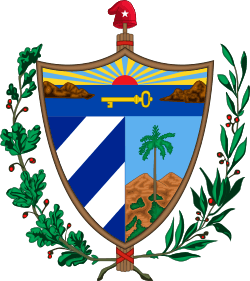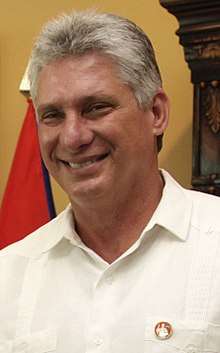Prime Minister of Cuba
| President of the Council of Ministers of Cuba
Presidente del Consejo de Ministros de Cuba | |
|---|---|
 Official Standard | |
| Style | Premier (informal) |
| Member of |
Council of Ministers, Council of State |
| Seat | Havana |
| Appointer | National Assembly of People's Power |
| Term length |
None The Prime Minister's term of office ends like the President of Cuba |
| Inaugural holder | Carlos Saladrigas Zayas |
| Formation | 10 October 1940 |
| Unofficial names | Prime minister, Premier |
| Website | www.cubagob.cu |
 |
|---|
| This article is part of a series on the politics and government of Cuba |
|
|
Executive |
|
Judiciary
|
|
The Prime Minister of Cuba (Spanish: Primer Ministro de Cuba) – official title: President of the Council of Ministers (Spanish: Presidente del Consejo de Ministros de Cuba) – is the head of the Council of Ministers of Cuba.
The office of Prime Minister was first instituted in 1940 in accordance with the provisions of the Constitution of Cuba as amended in that year. The first Prime Minister of Cuba was Carlos Saladrigas Zayas (1900–1957), the nephew of former President Alfredo Zayas. The prime minister was also sometimes referred to as "premier". Between 1940 and 1959, Cuba saw fifteen changes of prime minister; Félix Lancís Sánchez exercised the role twice (1944–1945 and 1950–1951) while Fulgencio Batista held the position concurrently with that of President of Cuba for one month (April 1952) following a military coup. Fidel Castro became prime minister in 1959, replacing José Miró Cardona.[1]
The title of the office was officially changed on 2 December 1976 when a new national constitution, restructuring the government, came into force. Fidel Castro became president of the Council of State (President of Cuba) and also president of the Council of Ministers, elected by the National Assembly of People's Power. The President of the Council of Ministers is, however, still frequently referred to as being the country's "prime minister".
The incumbent since 19 April 2018 has been Miguel Díaz-Canel, who took over from Raúl Castro on that date.
See also
Footnotes
- ↑ 1959: Castro sworn in as Cuban PM BBC online.

